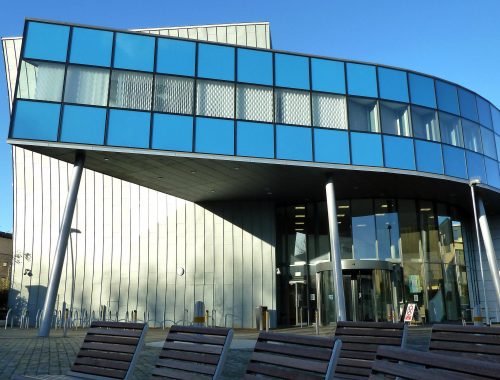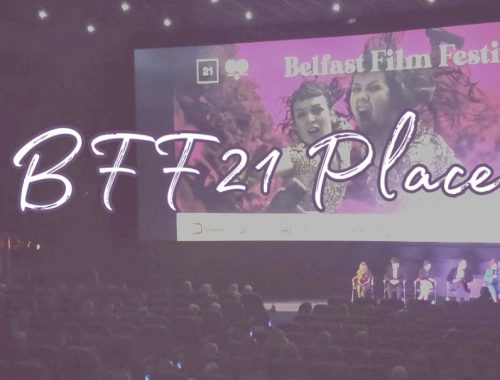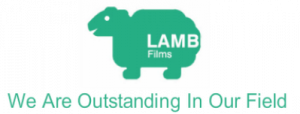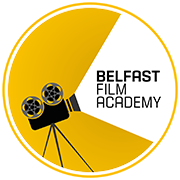Me, my CV and a Man called Larry
“Learning in the work context is crucial for organisational success“
— Ian Cunningham[1]
As Cunningham discussed, work-based learning has become more widely used and accepted in education as it accustoms young people to the world outside academia. Entering the final year of my degree, it was all hands on deck as we were tasked with finding work placement in our chosen industry. The summer prior to my final year was full of anxiety, staring at the screen of my laptop as I drafted my CV, sent emails and cover letters to any postproduction company in Belfast. The wait for a reply (or lack of replies as I would soon find out) was agonising. The deadline for having a placement secured loomed nearer and I had almost lost faith. To reflect on the initial experience of the module, I will use Gibbs’ reflective cycle (1998), exploring the ups and downs of seeking out a suitable 100-hour work placement.

Sometimes, connections are key!
I started the search mid-summer by approaching different production companies in Belfast. My top choice was
Ka-boom Post-production as I had worked with them before and wished to further my editing skills through their company. I created a CV with all my film experience and key skills. I sent this to the business email but I also decided to print it out and hand it to Ka-boom’s boss, Zac in person, in order to have the best chance of securing a placement. Despite my carefully crafted emails and detailed CV, I was having trouble getting the time and attention from Ka-boom and other production companies in the film industry.
Many of the customers I come into contact with, at the Belfast bar I work in, are employed by HBO on productions such as Game of Thrones (2011). These people range from location scouts, set designers, special effects artists and more. When all had seemed lost, when I hadn’t heard back from any possible employers and was ready to through in the towel, Scott, a retired location scout said to me, “my mate Garry’s mate Larry may have a placement for you.” Now this seemed rather ‘sketchy’ and the names seemed like something out of a cartoon skit, but I was out of options and therefore decided to give it a shot. I emailed this infamous ‘Larry’ who turned out to be Larry Cowan, the owner of Lamb Films and the Belfast Film Academy.
After a brief conversation through email, I sent across my CV which detailed my film work in most areas but primarily in editing and post-production. This took Larry’s interest as at the time he was in search of someone with editing skills. After this Larry quickly responded with a follow-up phone call to set a date to have an informal interview. We sat down at a coffee shop in the centre of town to discuss what my role would be as part of the Belfast Film Academy and his other production company. Despite being wracked with nerves and hardly being able to sit still in my seat, the discussion ended with Larry signing the preplacement paperwork.
I had done it!
A weight immediately lifted as the worry of not securing any experience was gone.
The role I would take on would be a mixture of different jobs. As part of the Film Academy, I would be helping to teach a charity filmmaking class for deaf people every Monday night for ten weeks at the Strand Arts Centre Cinema alongside Larry and the charity DSignArts.
D’Sign Arts
This charity works with the deaf and hard of hearing community, providing accessible art as well as a safe space to get creative. They have teamed up with Belfast Film Academy to provide an intro to filmmaking with the help of a British Sign Language Interpreter.
Roles & Responsibilities: I would act as a teaching assistant, taking notes and doing research, alongside teaching the editing week, since that is my area of interest and editing any footage we need for the class. Outside of the Charity class, within the scope of his own production company, Larry said he would make sure I got to edit any upcoming films to gain short credits and valued industry experience. The whole job seemed like a dream that couldn’t have been done without my prior contacts in the industry.
How it felt
The process of gaining a placement was a very stressful and anxiety-ridden journey for me. My feelings throughout were like a rollercoaster, full of ups and downs, yet waiting for a response was the worst part. Not knowing if you had succeeded or failed. After the initial (silent) rejection from my top choice, I felt defeated, a feeling that was only masked after finally gaining a place at the Belfast Film Academy. I had a sense of relief but also excitement as it would be something different to what I had envisioned working in.

The Pros & Cons
There were a lot of pros and cons to the initial module and placement seeking. One of the negatives would be possible employers not replying to signify success or failure in gaining a placement. The ‘radio silence’ from companies was not helpful in the experience, especially after sending an email or turning up in person to hand in a CV. However this negative is outweighed by the positive aspect of the help from industry professionals I know who finally steered me in the direction of Larry Cowan and the Belfast Film Academy.
In terms of the actual module, my initial experience was positive. The class provided help in creating a professional Cv and cover letter tailored to the industry you wished to work in, showing a detailed guide [8] of what employers look for, which will change for each company you apply to, as well as how to present yourself in the most professional way possible. Although this happened after already applying to companies, this knowledge will greatly help me in the future for applying for jobs outside of University.
Final Thoughts
Overall after successfully obtaining an interesting and relevant work placement, I am glad that my original choice was not available as I am now working in an area I had never considered, gaining a new, different type of experience while still enhancing my previous technical skills. I can now see my confidence has significantly improved from the start of this process due to having to conduct myself professionally despite any setbacks.
If the situation of gaining work experience arose again, I would start the application process a lot earlier than I did the first time to reduce the stress and have a secured placement with time to spare before the deadline. I would speak to any industry professionals I know to ask about possible jobs as speaking directly to the person or company definitely works better than sitting impatiently waiting for a reply by email. By fixing these aspects, I believe it would have made the initial experience of finding a work placement a more enjoyable process.
References
[1] Cunningham, Ian. The handbook of work-based learning. Aldershot: Gower. 2004. (Accessed 23rd November)
[2] https://my.cumbria.ac.uk/media/MyCumbria/Documents/ReflectiveCycleGibbs.pdf (Accessed 21st November)
[3] Ka-boom Post-Production Studios; https://ka-boom.tv/
[4] Lamb Films; https://www.lambfilms.com/
[5] Belfast Film Academy; https://www.facebook.com/BelfastFilmAcademy/
[6] Strand Arts Centre; https://www.strandartscentre.com/
[7] D’Sign Arts NI; https://www.dsignartsni.com/
[8] CV Checklist – https://www.qub.ac.uk/directorates/sgc/careers/CVsMakingApplicationsandInterviews/ (Accessed 24th November)
Bibliography
[3] Clarke, J. The right way to write your own CV (Links to an external site.). Tadworth: Right Way. 2001. (Accessed 22nd November)
[4] Fanthome, C. Placements: A Survival Guide for StudentsLinks to an external site. Basingstoke: Palgrave Macmillan. 2004. (Accessed 19th November)
Asking For Help
You May Also Like

Facing Avoidance
26 November 2021
Roles Reversed
26 November 2021


